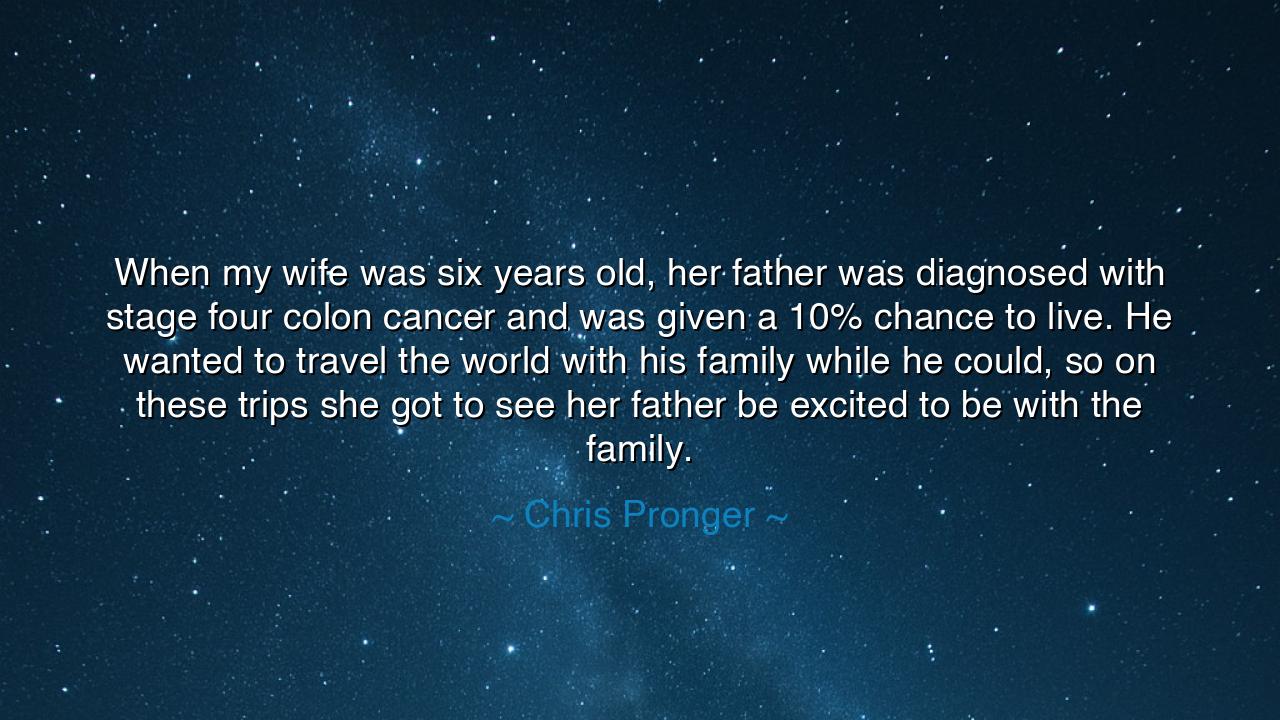
When my wife was six years old, her father was diagnosed with
When my wife was six years old, her father was diagnosed with stage four colon cancer and was given a 10% chance to live. He wanted to travel the world with his family while he could, so on these trips she got to see her father be excited to be with the family.






Hear, O children of the earth, the sorrowful yet powerful words of Chris Pronger, for they carry with them a profound truth about the fragility of life and the deep power of family. He speaks of his wife’s father, a man who, upon receiving a dire diagnosis—stage four colon cancer, with only a 10% chance to live—chose not to succumb to despair, but to embrace the moments he had left with vigor and determination. This man, though faced with the specter of death, chose to live fully in the time that remained, and to share that life with those he loved. He traveled the world with his family, not out of mere desire for adventure, but out of a profound need to bond, to create memories, and to show his loved ones the depth of his love and appreciation.
In these words, we hear a truth that reverberates through all ages: life is fleeting, and its value is not found in the accumulation of riches or the pursuit of fame, but in the relationships we cultivate and the memories we forge with those closest to us. The story of this father, who faced the certainty of death with courage and hope, is a tale that echoes the ancient wisdom of those who lived and died with purpose. In the face of his impending end, he chose not to retreat into solitude, but to embrace connection, to spend his remaining days not in fear, but in joy and gratitude. This choice—this act of courage—is a lesson for all of us, a reminder that even in the face of inevitable loss, we can still find meaning in the love we give and the moments we share.
In times long past, the ancient warriors understood the fleeting nature of life, and it was said that they fought not for glory alone, but to honor their ancestors, to live a life worthy of remembrance. Take, for example, the great Spartan warriors who, before heading into battle, would often speak of the honor they sought to bring to their families, their city, and their nation. Though they knew death might come swiftly, they chose to live with valor and strength, to spend their days building legacies of honor and brotherhood. In the same way, this father, though faced with his own mortality, chose to honor his family by giving them the greatest gift: his presence, his love, and his commitment to making their time together meaningful.
This lesson is not merely one of endurance, but of love—a love that transcends the trials and tribulations of life. When Pronger speaks of his wife’s father’s joy in being with the family, he speaks of the ultimate gift of love: presence. For what is love, if not the ability to be fully present with another, to offer them your heart and your time, even when the world seems to be slipping away? This father’s decision to travel, to seek out joy in the final moments of his life, is a testament to the power of family bonds. In the face of death, he chose to celebrate life, to show his family that love is not measured in the years we live, but in the moments we choose to embrace.
Let us look to the example of another, Marcus Aurelius, the great Roman emperor and philosopher. As he faced his own mortality, Marcus wrote in his Meditations about the fleeting nature of life, urging us to focus not on what we cannot control, but on how we choose to live. He understood that our legacy is not defined by the length of our days, but by the way we live them—by the integrity of our actions and the love we give to others. In the same way, the father in Pronger’s story chose to live with purpose and joy, leaving behind not just memories of struggle, but of love and connection, of a family bound together by their shared experiences.
This story calls us to reflect on our own lives and ask: What will we leave behind when our time is done? Will we, like the father in this tale, choose to celebrate life in the time we have, or will we waste our moments in fear or regret? The lesson is clear: time is precious, and its value is not found in what we accumulate, but in how we choose to spend it. Let us take the example of this man—who, with so little time left, chose to embrace his family, to live fully, and to create memories that would endure long after he was gone.
To all who hear these words, let them inspire you to treasure the moments with those you love. Do not wait for a tragedy to teach you the importance of presence, for life is uncertain, and its fragility is a lesson we must learn now, before it is too late. Live with purpose, live with gratitude, and live with the knowledge that love is the legacy we leave behind. Like the father who traveled the world with his family, seek joy, seek connection, and remember always that it is not the years you live, but the love you give, that defines a life well lived.






AAdministratorAdministrator
Welcome, honored guests. Please leave a comment, we will respond soon